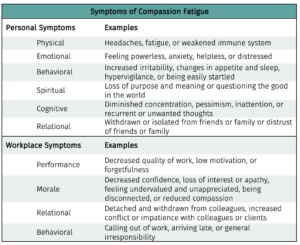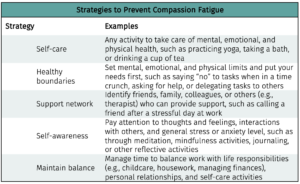Compassion fatigue, also called vicarious trauma, refers to the negative emotions that individuals feel from helping others at work. This is most common in “helping professions”, including first responders (e.g., counselors, crisis advocates, social workers, police officers, fire fighters). Between 40%-85% of helping professionals experience compassion fatigue or vicarious trauma (Mathieu, 2012).
Compassion fatigue consists of two parts: burnout and secondary traumatic stress. Burnout refers to the slow onset of feelings of hopelessness and that one’s work has little positive impact. Secondary traumatic stress refers to the rapid onset of symptoms that mirror posttraumatic stress disorder, such as nightmares, difficulty sleeping, and flashes of intrusive images and/or thoughts, due to secondary exposure to extremely or traumatically stressful events. There are many symptoms of compassion fatigue, as shown below.

Compassion fatigue can impact anyone in a helping profession, especially those who work closely with survivors of violence (e.g., counselors, crisis advocates, social workers, police officers). There are certain risk factors that may increase a person’s vulnerability to compassion fatigue. Personal risk factors for compassion fatigue can include having a history of trauma or a pre-existing psychological disorder, isolation, and a lack of social support. Professional risk factors can include a lack of professional support or supervision, inadequate training, and a high number of clients with severe traumatic experiences (Bonach & Heckert, 2012; Bell, Kulkarni, & Dalton, 2003). Fortunately, there are many strategies to prevent compassion fatigue, as shown below.

Resilient Retreat will be offering services that can help prevent vicarious trauma. For more information, call 941-343-0039.
References:
Bell, H., Kulkarni, S., & Dalton, L. (2003). Organizational prevention of vicarious trauma. Families in Society: The Journal of Contemporary Social Services, 84(4), 463-470.s
Bonach, K., & Heckert, A. (2012). Predictors of secondary traumatic stress among children’s advocacy center forensic interviewers. Journal of Child Sexual Abuse: Research, Treatment, & Program Innovations for Victims, Survivors, & Offenders, 21(3), 295-314.
Mathieu, F. (2012). The Compassion Fatigue Workbook. New York, NY: Routledge.